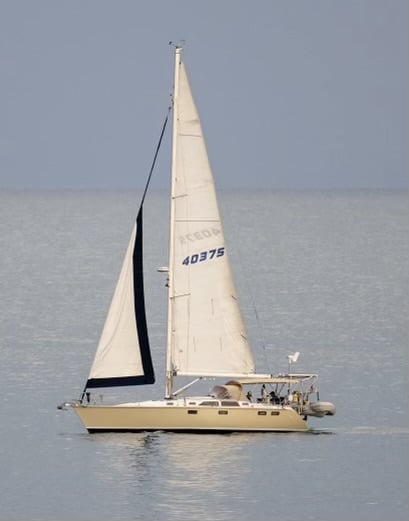I’ve recently learnt to sail but when I’m on the water, all of my theory goes out of my head. Can someone please explain the steps of sailing or confirm what I’ve written below?
- check the wind direction
- think of where I want to navigate to and point the boat relative to the wind.
- think of the points of sail. For the boat’s position relative to the wind, change the main sail to the respective point of sail and the wind will catch the sail.
- use the main sheet to keep the sail in the “point of sail” direction that the wind should be in.
- make very small movements to keep the boat going straight towards my target
- once i’m going straight, check the sail if it’s luffing periodically and trim the sail if necessary
when tacking,
- use the tiller to turn the boat around, either pull it fully towards or away from me
- once the boat is turned around, pull the tiller so that it’s now straight and you can let the tiller handle lay on the side of the boat
- switch sides as usual
thank you!


You’re (almost) book right, but sailing wasn’t made by or for people reading/writing about it.
Most seamanship is actually about managing poor conditions, poor weather, poor alertness, lack of judgement due to weather fatigue/boredom/hangovers, but also changes in weather, wind, currents, equipment failure etc.
I would suggest you start from the opposite direction, see your boat as a tool, and explore what you can do with it.
Try what happens if you pull in your sail or not in the current wind, where is a nice sweet spot?
Do you know how to find the wind direction without your instruments? How precise can you get?
How does the tiller respond, what happens if you turn fast or slow or in between? Is there a difference up against the wind or down? Is there a difference to port or starboard?
How straight can you steer? How straight does the boat go when you steer straight? How does this change over different winds?
If you don’t try this with a comfortable/skilled sailor, you might want to avoid some things with risk of injury, like:
keep to low to moderate winds, with mild gusts, when practicing (or the forces and noise will make things unhelpfully harder),
only do tacks/turning against the wind for now (turning with the wind behind you can have the boom launch you off the boat, and wind you or even knock you out), and
Do have backup emergency equipment, if something goes bad you do want to be rescued even if your SRC got wet, mobile lost signal, and you fell overboard. Prepare according to your size boat and waters, signal whistles, flares, or automated beacons can be good. Also make sure that someone will look for you, leave a plan with check-in times with someone on land.
(A plan with check-in can be as simple as: I’m going out thereabouts over the weekend, I’ll send you a text on where I anchor in the evening, and I’m expected back late Sunday night. Here’s my number, here’s the number for the rescue service)
And in case your brain works in a way that needs steps, for a practice trip I’d suggest these steps:
… Get out on the water, prepare the rig you want to practice, etc…
Pick a direction you want to go in, note a landmark, buoy, or something stationary to steer towards. If you don’t pick a direction straight against or with the wind, the rest will be easier.
Try adjusting your sails to give you some speed. If you have a common Bermuda rig, start with your foresail, it’s going to be easier to see when it’s good, and it will give you speed enough to steer. I usually teach it as: take the sail in until it gets that nice billowed curve, and then let it out again until it just about can’t keep it. Then do the same with the mainsail.
Note that if the boat changes angle against the wind, you’ll have to adjust the sails and/or start over. When you’re starting out, you’ll have no chance to keep the boat going straight for long enough to both hit your landmark and trim your sails.
Check your course against your goal, try to adjust course a bit (10-15 degrees) and adjust the sails as needed.
Now try keeping course against the wind rather than the landmark. Can you sail with the wind straight from the side? How do you adjust the sails for that? How does that affect what you need to do with the tiller to keep straight?
Repeat for different wind angles. Also, note that winds change around obstacles, sails, and with time of day. Typically not a deal breaker, but enough to be confusing if you’re not aware.
This is probably enough for the first dozen trips. Remember to save energy to be able to get back, moor, and set everything ship shape again.
As you get more comfortable, you can try doing tacks (same sail adjustment procedure), then try doing a tack so that you only need to adjust the foresail, then maybe trying deliberate listing, sailing donuts (with continuous sail adjusting) with a gybe, and then onto maneuvering tasks like stopping at a buoy, doing a figure of eight Man-overboard maneuver, picking up something out of the water.
And somewhere along this you start doing actual boating, learning to moor, anchoring, cooking, planning your days, routes, planning for weather, etiquette with other boats, etc.